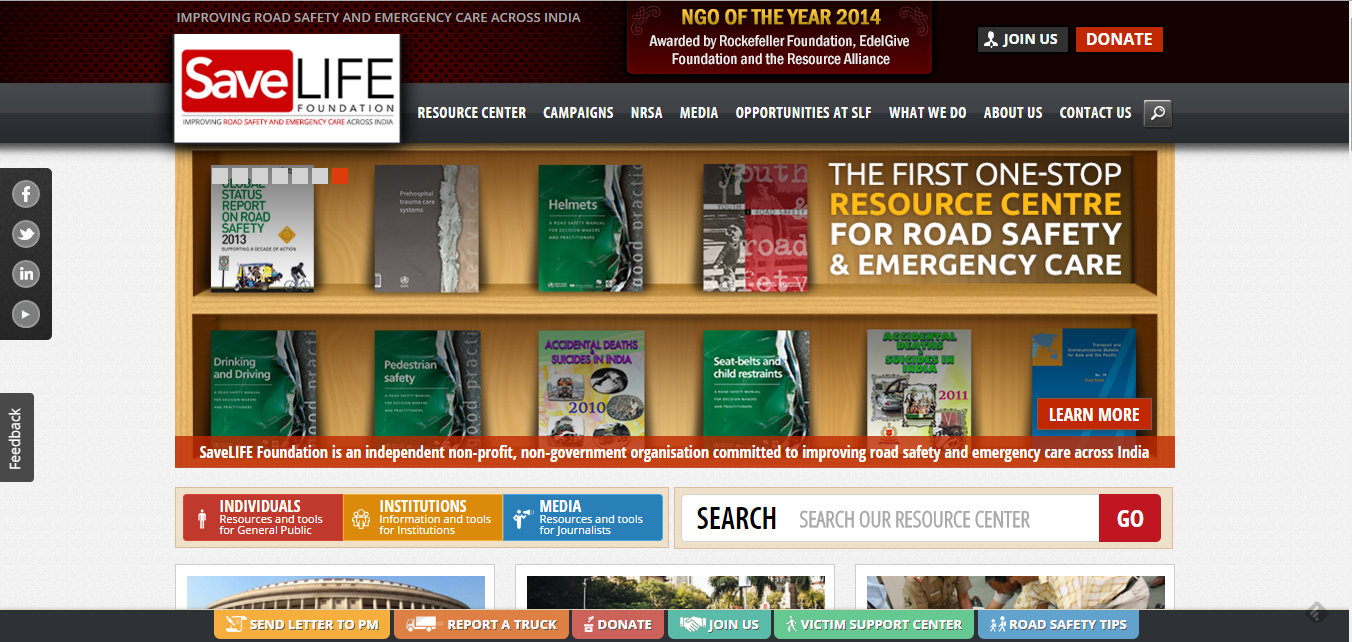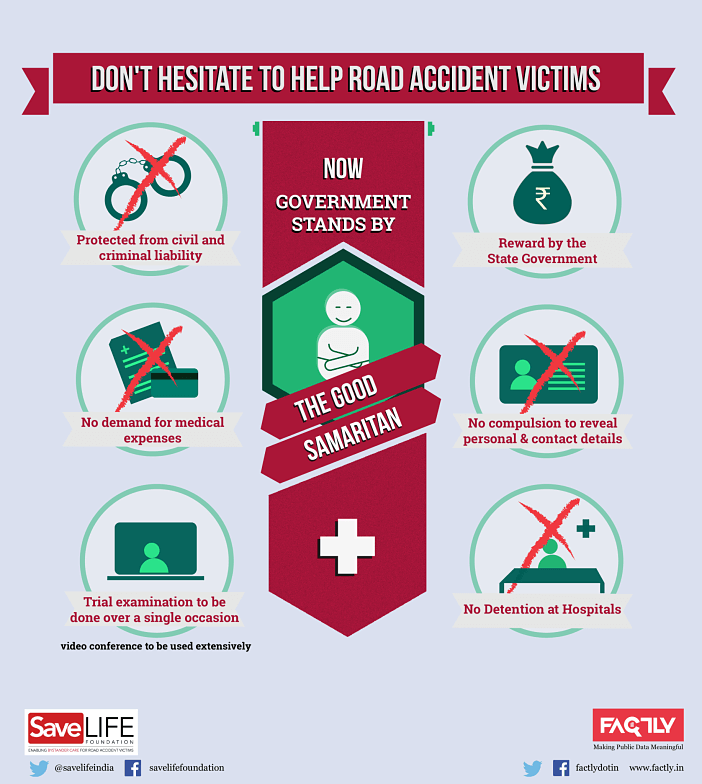‘What problem can I face if I take an unknown road accident victim to hospital?’ I guess this question prevents many bystanders with helping heart to help a road accident victim. Surbhi Agarwal from UPES Dehradun writes on what you need to do in any road accident situation as far as legal risks about rescuing victims is concerned.
An economics professor at Carleton University in Ottawa, Canada has perfectly said that
“We are selfish and busy, but more importantly, we are afraid of a potential liability or harassment by the police. Human Beings are driven by both egoistic and altruistic motives. When you are in a situation where you can help, you might consciously believe that you are saving someone’s life, but on the other side, there is the danger that you might be harassed or even accused in the case”.
Road related death toll in India
India is a country which has the largest number of road-related deaths. As per the government statistics reference:
- Road Accident – 4.8 lakh Injured/year
- Vehicle Collision – 1.4 lakh Died/year
- 16 People/Hour – dead by road accident
- 20 Children/Hour – Under Age of 14
According to the latest data released by the National Crime Records Bureau (NCRB), biggest reasons for road fatalities were:
- speeding and
- dangerous driving
The 201st report of the Law Commission corroborates by stating that, according to doctors:
“at least 50% of the fatalities can be averted if victims have been admitted to the hospital within the first one hour of post-accident”
Let’s explore why that is not happening.
Why road accident victims are not getting immediate help?
Reason 1 – Police Harassment:
Most of the people in India are afraid to touch a victim because of a fear of getting involved in a legal hassle and this leads to thousands of deaths every year. In India, every aam aadmi faces a dilemma while helping an accident victim that whether to dodge police harassment or save a life.
Reason 2 – Hospital:
Even if someone dares to take the unknown road accident victim to the hospital, they are harassed by the police, hospital authorities and repeated visits of the court. They are treated like criminals, hospital authorities don’t leave the bystander until the police arrive. They are being interrogated unnecessarily, both by the hospital authorities and by the police.
Reason 3 – Crowded Tamasha:
Because of all these they hesitate to involve themselves in such road accident matters. And what they prefer is to stand around the victim or make a circle around the victim and see all the tamasha, but did not dare to take the victims who have succumbed from the injuries.
Reason 4 – Social Sharing:
They also like to make videos of such accident and prefer to post it on Facebook or on other networking sites, instead of using that time to help the victims.
Due to the apathy of society, many people just pass by; by leaving the person in the critical conditions and this apathy is mostly due to people being scared of police and legal proceedings.
Road Accident Law
Root Cause for hesitation:
The root cause because of which bystanders hesitate to help such victims is because they are subjected to civil and criminal liabilities and are forced to disclose their identities. They also think by helping such victims, they will waste their own precious time and therefore, they don’t want to indulge into such troubles and also because the police and hospital authorities take a lot of time to interrogate and also harass them.
Save Life Foundation Survey:
In a National survey done by the Save LIFE Foundation, the reason came out why people don’t want to come forward to help is because of the following:
- 77% say that they were unlikely to help accident victims because hospitals unnecessarily detain good Samaritans and refuse treatment if money is not paid for the treatment.
- 49% say that they don’t like to be late and bear extra transportation costs.
- 88% say that they are unlikely or reluctant to assist injured victims because of legal hassles, repeated police questioning and court appearances.
- 74% bystanders are unlikely to assist a victim of a serious injury, irrespective of whether they are alone at an accident spot or in a group.
- 88% expressed the need for a Good Samaritan legal environment to help the accident victims.
- 36% of all the bystanders feel that bystander’ responsibilities end with calling the emergency numbers.
- 77% respondents are not aware of which emergency number to call to report an accident.
- 78% of respondents belong to the lower section; probably the poorest people on the road are unlikely to come forward to assist a victim. 72% of middle income and 70% of Upper-Income stated that they would not come forward to help the injured victims.
Road Accident Law Loop Holes
Therefore, there is a great need for our State and the Central Governments to bring the necessary legislation that will not only protect citizens who help road victims but also recognize and reward them for their acts. The lives of many people, who have lost their lives in this accident, could have been saved, if they have received timely help.
Several countries like Europe, America, Australia already have the legislation in the form of Good Samaritan laws, while indemnifying those who choose to voluntarily help a person in imminent danger. They have legal standers that encourage common people to help those in need of urgent medical care. In our country, helping an accident victim is asking for trouble.
Moral Duty
It has been rightly said that: no law is necessary to motivate the bystanders to attend to an accident victim. It is the moral duty of a person to take the immediate action and inform the victim’s relatives. But most people avoid this because of fear of police harassment and legal procedures.
Guidelines for Bystanders or Good Samaritans:
Bystander Care
A non-profit and non- governmental organization Known as the Save LIFE Foundation is working on enabling bystander care.
Bystander care is the immediate care that police and community volunteers can provide a critically injured person in order to improve his or her chances of survival.
Petition filed by Save Life Foundation to Protect Bystanders from Harassment
A petition was filed by the Save Life Foundation in the Supreme Court. After considering the petition, the court ordered the government to frame guidelines to shield Good Samaritans from harassment and thus enabled them to help accident victims. Most of these deaths have been prevented because bystanders had taken the necessary measures. Therefore, the new guidelines will have a legislative backing so that loss of precious lives can be saved.
The guidelines were officially notified on 13th May, 2015. Guidelines will be followed by hospitals, police and all other authorities for the protection of Good Samaritans.
The guidelines says the followings:
- A bystanders or Good Samaritan should be allowed to leave immediately after taking an accident victim to a hospital without having to answer any questions.
- Neither the police nor emergency services can compel bystanders to reveal their name or personal details; neither they will be liable for any civil or criminal liability.
- If required, only eyewitnesses to the accident can be asked for their addresses.
- The bystander or Good Samaritan will be awarded or compensated as decided by the State Governments to encourage other citizens to come forward to help the road accident victims.
- It is ensured that the bystanders who voluntarily disclose that they are eyewitnesses to accidents, not be subject to harassment or inconvenience while taking part in legal proceedings.
- Eyewitness statement will be recorded in a single hearing. They should not be called repeatedly to appear in the court.
- The disciplinary or departmental action will be initiated by the government concerned against public officials who coerce or intimidate a bystander or Good Samaritan for revealing their name or personal details.
- If a doctor fails to act to help an accident victim when they are expected to provide care, their actions will be seen as “Professional Misconduct and disciplinary action will be taken against them.
- All hospitals should publish a charter in Hindi, English and Vernacular language of the State and Union territory at their entrance, declaring that a bystander or Good Samaritan would not be detained or asked for money for treatment.
- All public and private hospitals will implement the guidelines.
Therefore, these guidelines have already shown its impact on various States. Due to these guidelines, no of deaths due to road accidents, has been decreased. These guidelines are helping those people who hesitated earlier to help the injured in road accidents.
Let me know in the comment section if you had any experiences of road accident. Maybe you witnessed an accident where you wanted to help someone but hesitated. Or God forbid, you or someone you know needed help after a road accident, but bystanders hesitated to help. I know these experiences are not easy to talk to, but you’ll feel better by talking about it with others. Let me know if you think these guidelines would make a difference.
[divider]Guest Author:
Surbhi Agrawal
B.B.A., L.L.B. (Hons.) IIIrd Year
University of Petroleum & Energy Studies
 Serato DJ Crack 2025Serato DJ PRO Crack
Serato DJ Crack 2025Serato DJ PRO Crack











 Allow notifications
Allow notifications


